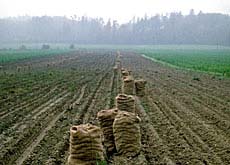
WTO criticises Swiss over farm subsidies

The World Trade Organization (WTO) has released a report criticising Switzerland’s protectionist agricultural policy.
It said the amount of state financial support for farming had not changed since 2000, the date of the Geneva-based WTO’s last policy review of Switzerland.
But the Swiss government has told the WTO that it is making “great efforts” to pursue the reform of its agricultural policy, which both the WTO and the Organisation for Economic Cooperation and Development have criticised in the past.
The WTO said on Wednesday that bilateral agreements with the European Union had led to some market liberalisation in Switzerland, but pointed out that the agriculture sector was still lagging behind.
It added that Swiss agricultural policy still had to distance itself from the principle of self-sufficiency that is set out in the country’s constitution.
Agricultural imports that are in direct competition to home-grown produce are still subject to high customs tariffs.
This is mainly to the detriment of Swiss consumers and other sectors of the Swiss economy, said the WTO.
The WTO said the level of state subsidies for farming had not changed for four years, although it noted that a gradual move away from price support towards direct payments had continued.
Swiss response
In its report, the Swiss government said its agriculture reform policy was an ongoing process and showed the country’s determination to benefit from new export possibilities.
The Swiss maintained their aims were to ease trade in agricultural products and fulfil the country’s obligations under the WTO Agreement on Agriculture.
The government told the organisation that agriculture reforms also included “an adequate response” to society’s concerns about ecology, food safety and animal welfare.
It said once all the instruments of the “Agriculture Policy 2007” were in place, the government would hardly intervene any more in the market.
Agricultural reforms
The government report said that agricultural reforms in Switzerland would be pursued beyond the present decade and contribute to necessary structural adjustment in a “particularly vulnerable sector”
Last August Switzerland signed up to an international agreement with the WTO, which foresees the gradual phasing out of protective tariffs and subsidies for farmers.
The country’s agricultural community criticised the move, and warned that more farmers would go out of business.
In November the Federal Agriculture Office warned that farmers stood to lose an estimated SFr1.5 billion ($1.3 billion) to SFr2.5 billion from 2008 because of the new WTO rules.
Farmers are already having a tough time, with 2.5 per cent of farms having to close between 1999-2003 and many farmers having to diversify to survive.
swissinfo with agencies
The WTO promotes free trade by persuading countries to abolish import tariffs and other barriers.
It was founded in 1995 as the successor to the General Agreement on Tariffs and Trade (GATT).
It has 148 members. China joined in 2001, but Russia is still battling to become a member.
The principle of agricultural self-sufficiency is set down in the Swiss constitution. It was adopted during the Second World War.
Reform of the sector only really started in the 1990s, following the GATT and WTO trade rules.
But Swiss farmers still receive higher subsidies than their counterparts in other countries, despite a move away from price support towards direct payments.

In compliance with the JTI standards
More: SWI swissinfo.ch certified by the Journalism Trust Initiative



























You can find an overview of ongoing debates with our journalists here . Please join us!
If you want to start a conversation about a topic raised in this article or want to report factual errors, email us at english@swissinfo.ch.